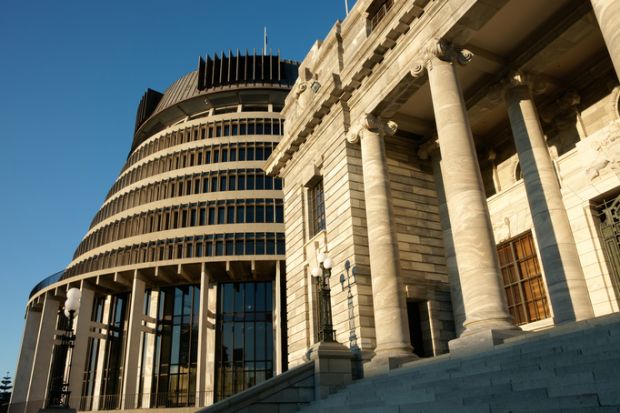The union representing New Zealand academics has failed to convince the government to intervene in its pay dispute with universities, as a new wave of industrial action sweeps the country.
Tertiary Education Union (TEU) members rallied on the lawn of parliament in Wellington after prime minister Jacinda Ardern had brushed off their request for the government to convene a “tripartite forum” to resolve pay issues.
Ms Ardern had told the Stuff news website that such matters were best left to universities and unions to resolve. “We have increased the subsidy rate from central government in order to support universities with their additional costs, but ultimately when it comes to a negotiation of this nature it is up to the two parties.”
In an open letter to Ms Ardern, the TEU pointed out that her government had “ultimate responsibility for public tertiary education”. National secretary Sandra Grey said it was “long past time” for the government to take its share of responsibility for the issues confronting the sector.
“They can’t keep saying they’ve increased funding when in real terms they have not, and they can’t keep saying negotiations around pay are simply matters between employers and their unions when the government has ultimate oversight and controls funding of the sector,” she said.
Inside parliament, Greens tertiary education spokeswoman Chlöe Swarbrick asked whether the government would lead tripartite conversations to “break the impasse on wages and resultant strike action”.
Education minister Chris Hipkins pointed out that universities did not support the idea. Consequently, he did not consider it constructive “to try and convene a tripartite meeting where the employer party was an unwilling participant”.
Asked whether he would “step in to help resolve issues” at Auckland University of Technology (AUT), where a restructure proposal threatens over 200 jobs, Mr Hipkins said universities’ institutional autonomy was “guaranteed by law”.
The union says that when similar tripartite discussions were last conducted in 2005, there was no suggestion of a threat to institutional autonomy. “The world didn’t end,” said incoming TEU president Julie Douglas. “In fact, it delivered a positive outcome – everybody won. I can see no practical reason to not even attempt a discussion.”
University staff have staged repeated industrial action following a day of coordinated protests on 6 October. Part-day stoppages have occurred at AUT, Massey, Lincoln, Otago universities, and Victoria University of Wellington. A proposed three-day ban on processing students’ marks at the University of Waikato has morphed into full strike action, after the university said it would not pay participating staff.
TEU members are upset at university pay offers well under the current inflation rate of 7.2 per cent, and at proposals by AUT and Massey University to cut about 300 positions.
In parliament, Ms Swarbrick asked Mr Hipkins whether he agreed with his 2001 statement when, as Victoria University Students’ Association president, he said his comrades were frustrated with politicians’ “broken promises” and the Labour Party should “put their money where their mouth was before the election”.
“Time has moved on,” Mr Hipkins replied.
Register to continue
Why register?
- Registration is free and only takes a moment
- Once registered, you can read 3 articles a month
- Sign up for our newsletter
Subscribe
Or subscribe for unlimited access to:
- Unlimited access to news, views, insights & reviews
- Digital editions
- Digital access to THE’s university and college rankings analysis
Already registered or a current subscriber?











